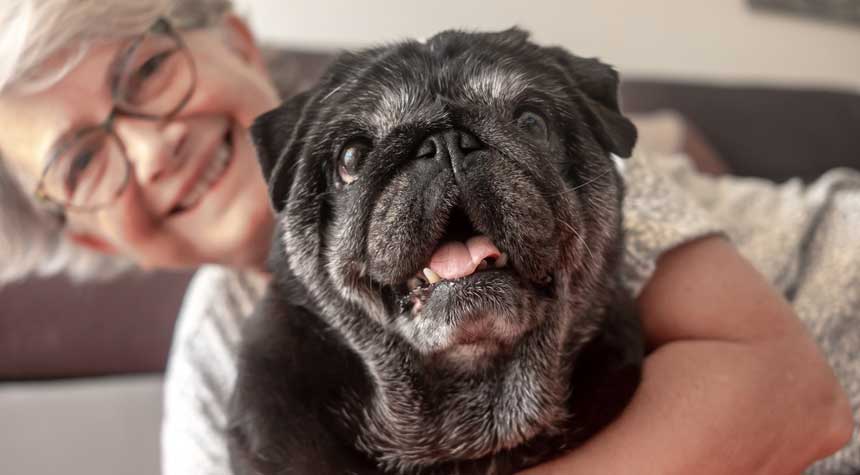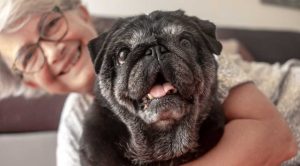
Why Does Your Dog Get So Excited To See You?
Sometimes, after a tough day, it’s heartwarming to have your dog greet you at the door, barking, jumping on you, and running in circles. Your dog may also get excited when she sees you grabbing her favorite toy because she knows that it’s playtime with her pet parent.
What pet parents may not know is that they have triggered “frenetic random activity periods” (FRAPs) in their dogs. FRAPs, also known as “zoomies,” are spontaneous bursts of extreme energy. During this period, dogs spin around in circles, chase their tails, or run wildly around the house. Zoomies are a dog’s way of releasing pent-up energy, excitement, or happiness, especially after a low period of activity or stressful situations.
There are several reasons why your dog experiences FRAPs, according to Alison Gerken, a board-certified veterinary behaviorist at the SPCA in San Francisco, California. These reasons range from neurobiology and relationship development to emotions and learning, all of which are supported by research.
Dogs Develop a Special Bond With Their Pet Parents
Studies have shown that dogs get excited because they can develop attachment bonds, “and those attachment bonds can look like the attachment bonds that human infants develop with caregivers,” Gerken explained to Popular Science. “It’s one of the many reasons we often refer to our dogs as our ‘babies.'”
Not only do dogs form attachments to humans, but research also suggests that they recognize their owners and respond differently to them than to strangers. Dogs can distinguish between familiar and unfamiliar faces, even though their vision is not as sharp as their sense of smell or hearing.
“Results showed that dogs do recognize their pet parent, and they behave really differently with that pet parent upon reunion,” Gerken said. “This includes a lot more affiliative behaviors,” like nudging or nuzzling, the same types of interactions that strengthen human connections.
Dogs Have Memories, Too
Dogs may not have the best short-term memory, but they have a great long-term memory. Pet parents might also be amazed by what kinds of memories their dogs hold, and the types of memories they have:
1. Associative memory. With this type of memory, dogs can link and recall relationships between two unrelated things. For instance, dogs can associate your scent with playtime and affectionate moments, such as snuggles.
2. Episodic memory. This type of long-term memory involves recalling specific events and experiences. For example, dogs can remember where they buried their bone or where you hid their favorite treats.
3. Good and bad behavior. Dogs can be trained to learn about behavior through processes, such as classical conditioning and operant conditioning. In classical conditioning, dogs learn to associate a neutral stimulus with something they already know is positive. For example, a leash (a neutral stimulus) might signal that it’s time to go for a walk (something positive), and the sound of keys in the door (neutral stimulus) means the owner is coming home (something positive).
Operant conditioning means a dog associates its voluntary behavior with rewards or consequences. For instance, the dog may voluntarily run in circles or bring the pet parent a toy, and the pet parent may respond with an encouraging reaction to the dog’s behavior.
“The dog now knows that these operant behaviors they’re displaying are rewarding,” Gerken said. “So next time, they’ll do it again.”
Dogs Can Remember Scents
Dogs have a fantastic sense of smell. In fact, the Dog Project, a research project that began in 2012 at Emory University, found that the caudate nucleus, a region in a dog’s brain associated with reward, emotions, and positive expectations, was “most activated by the scent of the familiar person.”
“The first thing that a dog does is smell you,” Gerken said. After they smell you, dogs will most likely hear you. “We’ve learned that dogs can distinguish the voices of their pet parents, and not just voices, but also specific words, like ‘walk’ or ‘treat.’
Oxytocin Connections Between Humans and Dogs
Researchers have discovered that the hormone oxytocin, also known as the “love hormone,” influences not only human relationships, such as those between a mother and her newborn, but also the relationships between pet parents and their dogs.
Oxytocin is produced in the brain’s hypothalamus, goes into the bloodstream, and ends up in the urine. A landmark 2015 study collected urine samples from pet owners and their dogs before and after they interacted freely with each other for a period of time. The researchers found that oxytocin levels peaked when the pet parent and dog made eye contact. The longer they looked at each other, the higher their oxytocin levels became. The gaze triggered positive reactions, such as increased affection and softer facial features, forming what researchers called the “oxytocin-gaze loop” of positive reinforcement.
“Dogs get excited when they see us, secreting oxytocin by both parties and increasing the feel-good vibes,” Gerken added.
Dogs Have Their Own Way of Telling Time
If you’ve invited someone to your house at a particular time, you start to worry and become anxious when the person has not shown up at the designated time. But you breathe a sigh of relief and welcome them when they arrive safely at your home. The same holds for dogs.
Dogs are very intuitive about their pet parents’ daily routines. Suppose your dog is going wild when he sees you after being separated from you for a long time. In that case, your dog may be experiencing separation anxiety, an abnormal response to being left alone.
“Think about setting up a webcam and evaluating what your dog looks like when you’re out,” Gerken said. “Look for signs of distress such as pacing, panting, barking, howling, urinating, and defecating that require treatment.”
On the other hand, studies have found that the longer a pet parent or caretaker is away, the more exuberant a dog’s response tends to be when reuniting with the pet parent or caretaker. So, your dog may not be distressed if you’ve been away for a while; he may just be showing how excited he is to see you.
Source Links:
https://www.popsci.com/science/why-dogs-get-so-excited-to-see-you/







